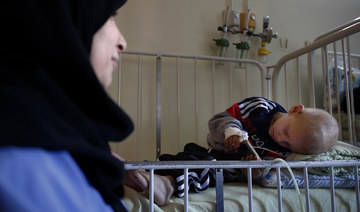BEIRUT: Lebanese hospitals and cancer patients are running out of morphine and its derivatives.
An appeal made by Elsy Aoun through the Al-Nahar newspaper went viral on Friday. The young woman said that her brother, a cancer patient who cannot find the medication he needs anywhere, is running out of the only drug that can relieve some of his pain. “We only have morphine left for 10 days. What are we supposed to do after that?”
According to a March 2021 report by the World Health Organization, Lebanon recorded 28,764 cases of cancer during the last five years, including 11,600 cases in 2020 alone.
Although medicines for incurable and cancerous diseases are still subsidized by the state, most drugs are running out amid the economic collapse that the country has been experiencing over the past couple of years.
The Ministry of Health said on Friday that it had given its approval to subsidize morphine before importing it two months ago, but the next approval to be issued by the central bank was delayed.
“We have contacted the importing company and agreed to start the process without waiting for the central bank’s approval,” the ministry said, adding that morphine should be available in the market within a week.
There are 445 registered cancer drugs in Lebanon. The cost of treating cancer patients “is about $200 million annually, and it may reach $400 million,” according to former Health Minister Jamil Jabak.
Dr. Ahmed Ibrahim, president of the Lebanese Society of Hematology and Blood Transfusion, said: “Every year, between 2,500 and 3,000 new cases of blood cancers are registered, in addition to thousands of patients under treatment and periodic monitoring.
“The various treatments are expensive, but they lead to a cure rate ranging from 60 to 80 percent, which is similar to global results. With the scarcity of necessary treatments, we find ourselves facing the possibility of not being able to treat patients, which may, unfortunately, lead to the death of many.”
A pharmacist in a Beirut hospital, who preferred anonymity, told Arab News: “Not all medicines are available in the hospital pharmacy, and morphine is a daily need in the hospital to relieve the pain of patients with stage four cancer. We need around 150 to 200 needles of morphine per month, and the demand may increase or decrease according to the patients’ conditions. Not all alternatives to this drug are as effective.”
She added: “Patients and their families are having a hard time searching for medicine. Some can be found on the black market, but only the wealthy few can afford them. The patients who are treated at the expense of the Ministry of Health face a real tragedy, especially since you can only get access to medication if you know someone inside nowadays.
“Morphine is classified as a high-risk drug, and every needle given to the patient must be signed by the doctor and two nurses, specifying the volume of the substance that was given and each drop wasted.
“Only one company imports morphine, unlike other drugs. Having one importing company makes it easier to negotiate securing this drug.”
The ministry said it is making all efforts to expedite the process of importing morphine and has asked those concerned to make this issue a top priority.
Doctor and former MP Ismail Sukkarieh, who has been fighting corruption in the health sector through the National Health Authority, which he chairs, said chaos has prevailed in the sector.
“It is true that cancer medicines are still subsidized, but this is rather theoretical now. Medicines are not available, and the key to the solution is with the central bank. It is ridiculous that the bank still subsidizes a type of coffee but cannot provide enough money to subsidize the medicines that people need to recover. Is coffee more important than human life?” Sukkarieh said.
He added: “In addition to the central bank, greedy medicine suppliers are the problem, as these people hide medicines in their warehouses to make illegal profits. No one is confronting them — neither the ministry nor parliament’s health committee.”
Sukkarieh said that doctors see tragic situations every day. “As soon as I enter the hospital, patients or their families stop me to ask for medicine. Even my fellow doctors who treat cancer patients have become helpless in the face of people’s tragedies. What is actually happening is accelerating the death of patients due to irregular treatment. Who has the right to shorten people’s lives like this?”






















